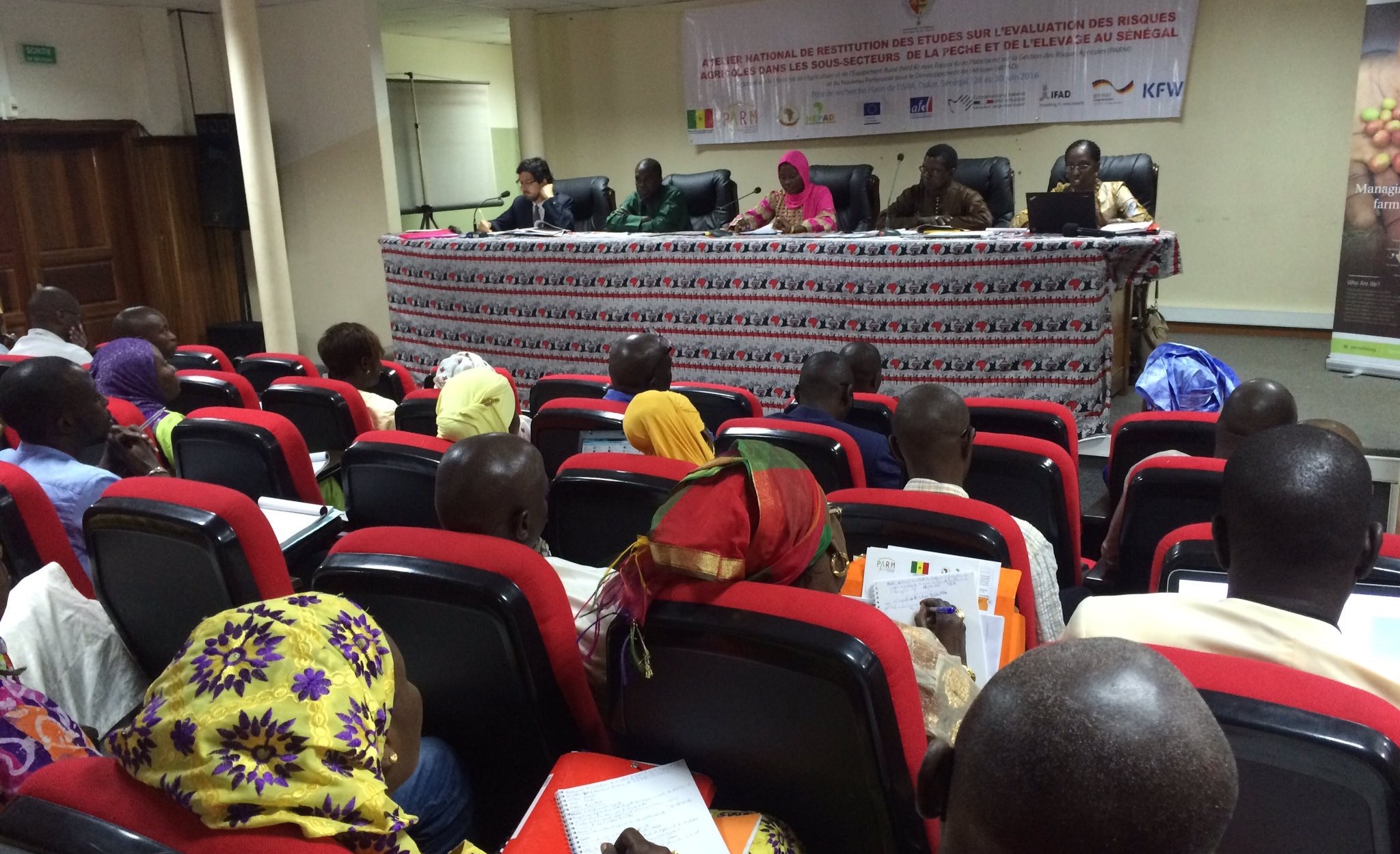PARM organized a National Stakeholder Validation Workshop in Dakar on 28-30 June, in collaboration with the Ministry of Agriculture and Rural Equipment, and NEPAD. During these three days, national experts and stakeholders discussed the preliminary conclusions of the Risk Assessment Studies commissioned by PARM.
Senegal faces many risks, from climate change and weather to volatile prices or policy constraints. However, the country is determined to face these risks and continue developing its agricultural sector.
In 2014, the World Bank published a study on agricultural risks in Senegal, which was mostly centered around cereal production. PARM, in agreement with the government, decided to launch two studies on the sub-sectors of livestock and fisheries, to complement the work of the World Bank and provide a complete analysis of the risks present in the country.

Participants an panel durnig the National Stakeholder Workshop on Agricultural Risk Management in Dakar, Senegal
Objectives of the workshop
The main objective of the National Stakeholder Workshop on Agricultural Risk Management jointly organized by PARM, the Ministry of Agriculture and Rural Equipment (MAER) and NEPAD was the presentation and discussion of the Risk Assessment Studies. More specifically, the three day workshop aimed to:
- Share a common definition and understanding of risk and the holistic approach to agricultural risk management
- Review the results of the two Risk Assessment Studies (on livestock and fisheries) undertaken by PARM experts
- Through a participatory approach, prioritize of the main risks that, in Senegal, affect the agriculture sector, with a special focus on smallholder farmers
- Share some experiences on existing ARM initiatives and tools in Senegal, and provide a more in-depth overview of potential tools linked to finance (insurance, micro-finance, remittances)
- Gather recommendations on strategic areas of future analysis for a better management of agricultural risks in the country.
Programme of the workshop
The workshop took place over three days in the office of ISRA (Institut Sénégalais de Recherches Agricoles – Senegalese Institute of Agricultural Research) in Dakar.
On the first day, PARM experts presented their assessment of agricultural risks in Senegal for the sub-sectors of fisheries and livestock, detailing their methodology and approach. A representative from ISRA presented the outcomes of the study undertaken by the World Bank in 2014. The results of the PARM Risk Assessment Studies were then discussed, and participants reflected on the risks present in Senegal in the sub-sectors of cereal and vegetable production, fisheries, and livestock. The concept of the holistic approach to agricultural risk management was also presented to the participants.
The second day of the workshop was dedicated to the presentation of tools and initiative to manage the risk identified and prioritized during the first day. After a general presentation of the existing tools by the PARM team, several initiatives taking place in Senegal were presented. These were related to various risks, from climate change and weather risks (drought resistant seeds, contingency planning), to market risks (contract farming for milk production). A special focus was put the risks related to the sub-sectors of fisheries and livestock, with the presentation of initiatives addressing risks specific to these two sub-sectors.
Finally, the third day was dedicated to financial tools for Agricultural Risk Management. The Financing Facility for Remittances provided participants with an introduction on the power of remittances for agricultural risk management, and on the challenges and promises of channeling remittances flows for investments in agriculture. This was followed by a round-table which brought together the main actors in agricultural insurance in Senegal for a discussion on the requirements for insurance implementation and its accessibility for smallholder farmers.
Main outcomes
Participants were able to prioritize risks in the agricultural sector in Senegal, based on the two PARM studies and on the World Bank study.
- For the livestock sub-sector, the main risks identified were bushfires, and animal pests and diseases.
- For the fishery sub-sector, the main risks identified were illegal fishery systems and practices, as well as a lack of regulation to protect and control the fishery exploitation
- For the cereal subsector, the main risks identified were droughts/erratic rainfall and locust infestations.
From these, some cross cutting areas were identified, namely the uncontrolled high variability of the productivity and production of each sub-sector, and the need for a more efficient information system that facilitates timely access to qualitative and quantitative data and information.
Next steps
Following these fruitful discussions, the experts in charge of the Risk Assessment Studies will review their analysis to incorporate comments made by national experts and stakeholders. A final version of their reports will then be shared with the Government for official validation.
A short video on the workshop and the PARM process will be published shortly.
